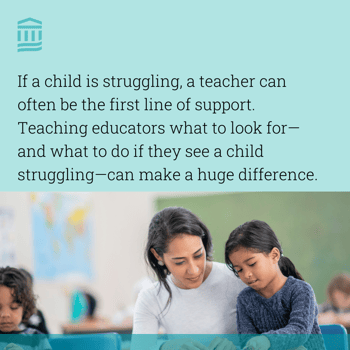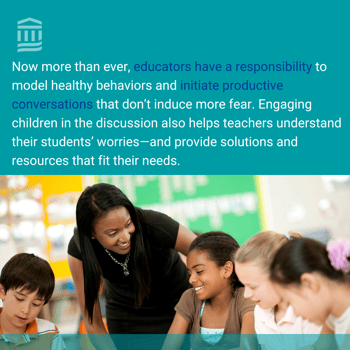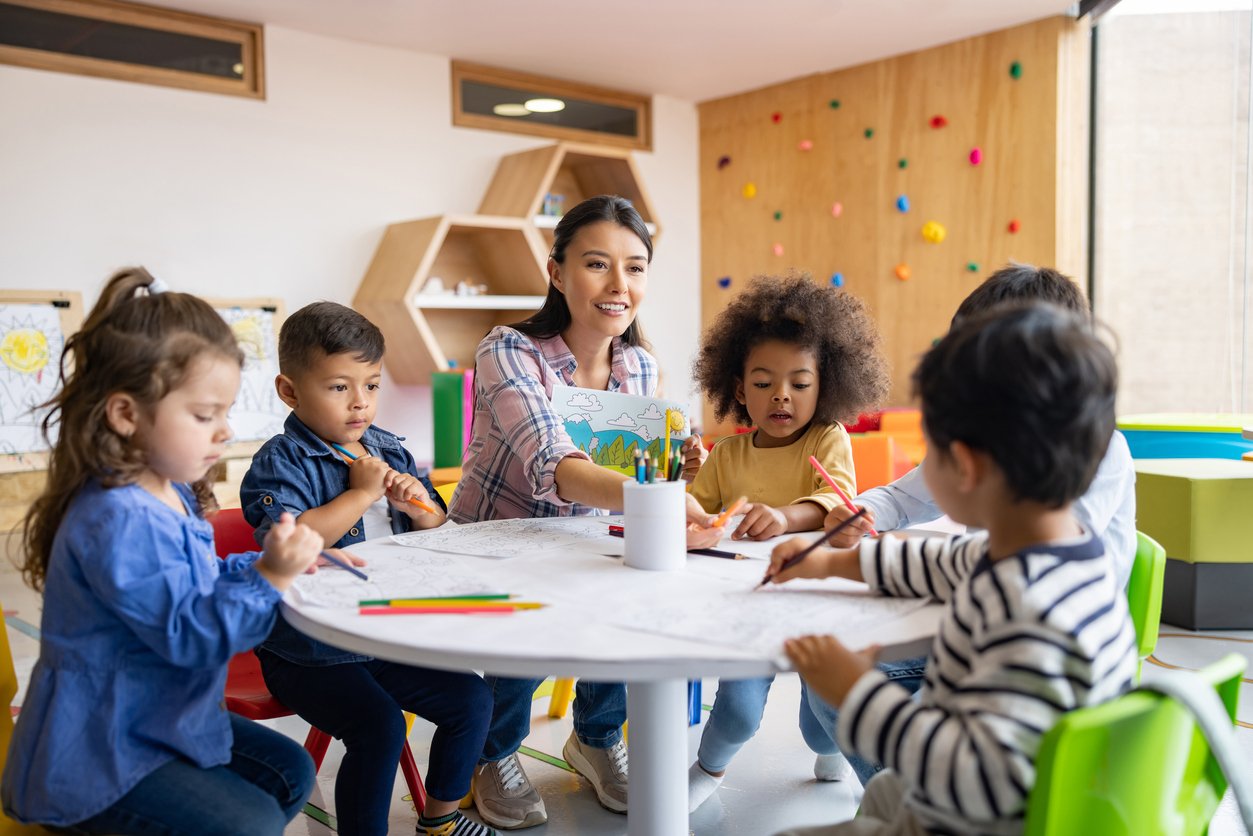Mental health education starts in the classroom
In recognition of Mental Health Month, we met with Khadijah Booth Watkins, MD, MPH of The Clay Center for Young Healthy Minds at Massachusetts General Hospital, to discuss the importance of supporting today’s educators. Empowering teachers with mental health tools and resources can have a lasting impact on their students while also benefiting teachers’ well-being.
 Dr. Booth Watkins: Khadijah Booth Watkins, MD, MPH, FAPA, DFAACAP, is the Associate Director of The Clay Center for Young Healthy Minds at Massachusetts General Hospital. She is a child and adolescent psychiatrist specializing in evaluating, diagnosing, and treating psychiatric disorders in children, adolescents, and adults. She’s passionate about expanding access to mental health resources to reach as many parents and young children as possible. She shared, “I'm passionate about education and having a hand in training the next generation of childhood psychiatrists. It’s important to empower them with the fundamentals of psychiatry, especially while working with children and families of color.”
Dr. Booth Watkins: Khadijah Booth Watkins, MD, MPH, FAPA, DFAACAP, is the Associate Director of The Clay Center for Young Healthy Minds at Massachusetts General Hospital. She is a child and adolescent psychiatrist specializing in evaluating, diagnosing, and treating psychiatric disorders in children, adolescents, and adults. She’s passionate about expanding access to mental health resources to reach as many parents and young children as possible. She shared, “I'm passionate about education and having a hand in training the next generation of childhood psychiatrists. It’s important to empower them with the fundamentals of psychiatry, especially while working with children and families of color.”
Educators play a crucial role in shaping the future of our children.
Teachers are an essential part of a child’s development. Post-pandemic, we’ve seen a much greater appreciation of teachers, especially after so many parents had to assist with schooling during stay-at-home orders. But another key takeaway that came out of the pandemic was the need for more mental health education—especially in schools to help educators support their students. Giving educators the basics can help teachers engage students in conversations around mental health and identify challenges earlier.
Dr. Booth Watkins noted, “Educating teachers with mental health knowledge enables them to collaborate with parents to discuss a path forward. It's so important to empower teachers from the start of their careers with a greater sense of the foundational resources that exist within their community. This will help them guide parents in the right direction, which is especially impactful today while we're in the middle of a severe shortage of mental health workers.”
This education can prove helpful for educators too. Implementing mental health best practices can help teachers prioritize the space and breaks they need, which is why it’s so important that they receive support from their school system.
Addressing the mental health crisis
 Supporting children’s well-being is a collaborative effort between teachers, parents, and guardians. Some children may also rely on teachers if their basic needs aren’t met at home due to financial constraints or environmental factors.
Supporting children’s well-being is a collaborative effort between teachers, parents, and guardians. Some children may also rely on teachers if their basic needs aren’t met at home due to financial constraints or environmental factors.
Dr. Booth Watkins added, “Some children look to school as a safe haven and rely on in-person learning for meals, therapies, or other services. When schools went virtual, this was a real challenge, especially if a teacher was the only trusted adult the student had to engage with. It’s incredibly important that a child know that they're loved and cared for and that teachers want the best for them.”
She also recommends incorporating social and emotional learning into classroom curricula. “You can weave it into almost any subject and begin to teach children about their role as a member of the community and how to set boundaries. These things are so important, in and outside of school, especially after dealing with the disruption of socialization during the pandemic.”
If a child is struggling, a teacher can often be the first line of support. Teaching educators what to look for—and what to do if they see a child struggling—can make a huge difference. That’s why the Clay Center for Young Healthy Minds is so invested in providing teachers and anyone else with a role in a child’s life with the tools to reach them faster. Early detection tends to lead to the best outcomes and can help prevent children from extensive suffering. Intervention can be the turning point that enables them to meet their social, emotional, and academic goals with less disruption in their life.
Supporting educators who are burnt out
.png?width=350&height=350&name=Copy%20of%20IG%20Quote%20(6).png) It’s important for teachers to have breaks to help prevent burnout. That’s why it’s essential to help educators learn about and become more aware of triggers that signal stress, anxiety, or feeling down. Dr. Booth Watkins wants teachers to know that self-care is neither selfish nor a luxury. It's what we must do to stay healthy and sustain ourselves.
It’s important for teachers to have breaks to help prevent burnout. That’s why it’s essential to help educators learn about and become more aware of triggers that signal stress, anxiety, or feeling down. Dr. Booth Watkins wants teachers to know that self-care is neither selfish nor a luxury. It's what we must do to stay healthy and sustain ourselves.
Educators must also ask for help and look to their peers. Schools can support this initiative by launching a peer-to-peer support group to empower teachers through past experiences. Depending on schedules, schools can offer this type of forum during the school day. Dr. Booth Watkins suggests, “Be flexible and creative! Maybe it’s office hours between junior and senior teachers. Perhaps it’s a lunch block where teachers meet to discuss challenges and offer advice. What’s important is that the school administration prioritizes creating the time and space to get teachers together whether they need someone to lean on or learn from.”
Mental health is essential to learning.
 Mental health is a growing problem that predates the pandemic. There’s been an increase in children dealing with anxiety, depression, and suicidal ideation, along with an overwhelming sense of loneliness and isolation. Because children rely on routines and structure, the pandemic was a massive disruption without warning.
Mental health is a growing problem that predates the pandemic. There’s been an increase in children dealing with anxiety, depression, and suicidal ideation, along with an overwhelming sense of loneliness and isolation. Because children rely on routines and structure, the pandemic was a massive disruption without warning.
Children of all ages felt so much uncertainty, especially if they had to help their parents with childcare. Dr. Booth elaborated, “During the pandemic, we found that many children had to help around the house, and at times, those obligations got in the way of school. That may have created some deficits for students when they returned to school.”
She added, “Plus, the political and racial distress was amplified while we were at home. Many layers created distress for children. Now they're back in school in a structured environment, but those other things are still heavy on young minds. They need the space to talk about what they're afraid of and for an adult to reassure them that they're safe.”
Now more than ever, educators have a responsibility to model healthy behaviors and initiate productive conversations that don’t induce more fear. Engaging children in the discussion also helps teachers understand their students’ worries—and provide solutions and resources that fit their needs.
Resources for educators
- 9 Self-Care Tips for Educators
- Self-Care for Resilience: Classroom Resources
- Stress and the Adolescent Brain: Webinar for Educators
If you’re a Mass General Brigham Health Plan member, we offer behavioral health benefits through Optum Behavioral Health. In addition, Lyra Health is also available to many Mass General Brigham Health Plan members.
Visit our behavioral health page for resources and guidance to support your behavioral health needs, including mental health and substance use.
